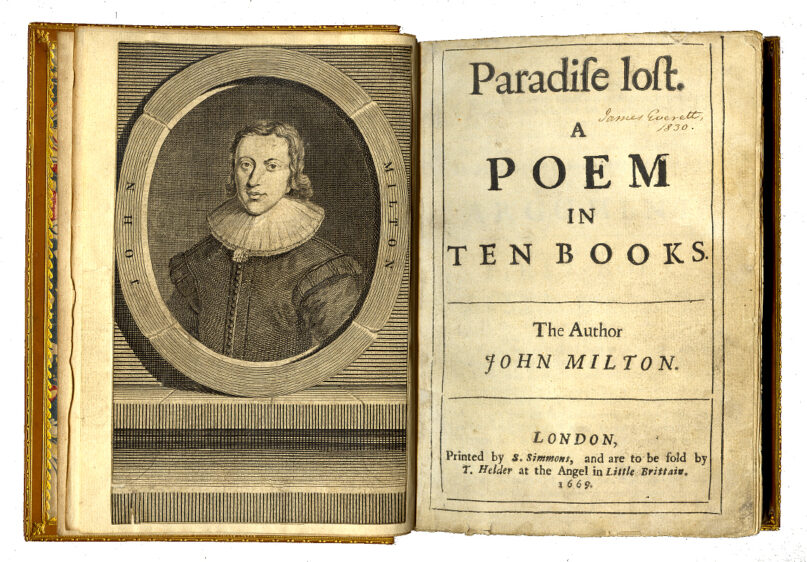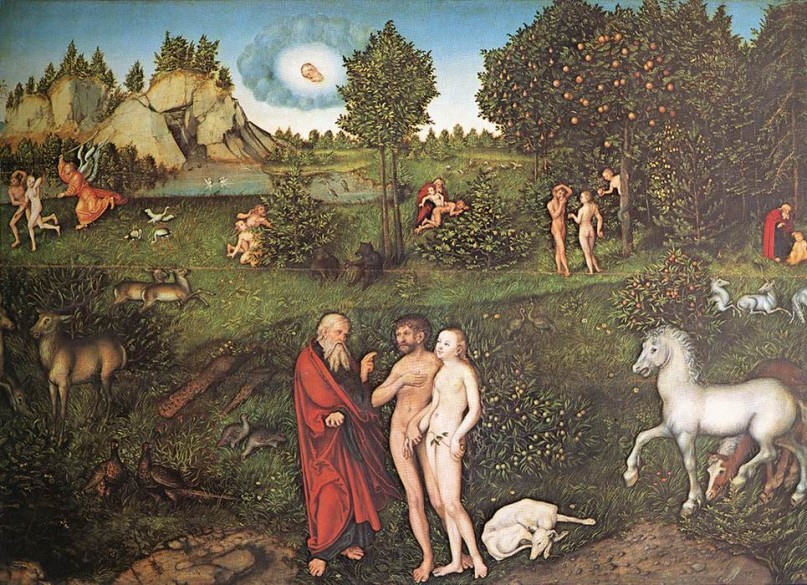The passages that got John Milton’s ‘Paradise Lost’ banned by a Florida county
Would students in the state's Orange County be tempted by the 17th century classic? One can only hope.
 A copy of "Paradise Lost" with a portrait of author John Milton. (Image courtesy of Creative Commons)
A copy of "Paradise Lost" with a portrait of author John Milton. (Image courtesy of Creative Commons)(RNS) — In its effort to comply with a new state rule in Florida that bans sexual content in books in public schools, one Florida county last month decided to err on the side of caution and require teachers to rid their classrooms of all books that might violate the rule. The school officials in Orange County provided a list of 673 books that they thought invited trouble from state minders.
News reports said the list is currently being reviewed by Orange County school staff, and one school board member voiced concern that the list represents “over censorship” spurred not by prudery but by fear of inviting trouble from the state.
The list included some traditional high-school English class go-tos such as “Jude the Obscure” by Thomas Hardy and “East of Eden” by John Steinbeck, as well as “The World According to Garp,” by John Irving, and John Grisham’s legal thriller “The Firm.”
But the surest sign that panic had broken out in Orange County was that the list also flagged “Paradise Lost,” the epic Christian poem about Adam and Eve’s expulsion from the Garden of Eden, written by 17th-century English Puritan John Milton.
There are many reasons to read Milton’s poem, whose10,565 lines are rich in language, texture and theology. I’d encourage anyone to read it, or even just to dip into passages every now and then. If that doesn’t motivate you, but lascivious appetite might, I can also recommend the sexy bits of the poem, which are presumably the parts that caused school officials to remove one of the masterpieces of world literature.
In Book Four of the poem (of 12), we are introduced to Adam and Eve in the Garden of Eden. The lines quoted here describe Adam leading his new wife (naked!) into their nuptial bed. They, having not yet sinned by eating the fruit from the Tree of Knowledge, are enjoying marital love in pure innocence, having fulfilled a day of working in the garden as God commanded and eager to fulfill his command to fill the earth.
… thou hast promised from us two a race
To fill the earth, who shall with us extol
Thy goodness infinite, both when we wake,
And when we seek, as now, thy gift of sleep.
This said unanimous, and other rites
Observing none, but adoration pure
Which God likes best, into their inmost bower
Handed they went; and, eased the putting off
These troublesome disguises which we wear,
Straight side by side were laid; nor turned, I ween,
Adam from his fair spouse, nor Eve the rites
Mysterious of connubial love refused:
Whatever hypocrites austerely talk
Of purity, and place, and innocence,
Defaming as impure what God declares
Pure, and commands to some, leaves free to all.
Our Maker bids encrease; who bids abstain
But our Destroyer, foe to God and Man?
…. Here, in close recess,
With flowers, garlands, and sweet-smelling herbs,
Espoused Eve decked first her nuptial bed;
And heavenly quires the hymenaean sung,
What day the genial Angel to our sire
Brought her in naked beauty more adorned,
More lovely, than Pandora, whom the Gods
Endowed with all their gifts…
These, lulled by nightingales, embracing slept,
And on their naked limbs the flowery roof
Showered roses, which the morn repaired. Sleep on,
Blest pair; and O! yet happiest, if ye seek
No happier state, and know to know no more.
They (naturally) fall peacefully asleep. Only the imagination of a Milton could require his readers to leave so much to theirs.
In Book Nine, Milton describes a bedroom scene that parallels the first, but after Adam and Eve have given in to temptation and sin and eaten the forbidden fruit. Their relationship is transformed. This time, the pair’s lovemaking, as well as the sleep that follows, is marred by guilt and shame.
…. from the bough
She gave him of that fair enticing fruit
With liberal hand: he scrupled not to eat,
Against his better knowledge; not deceived,
But fondly overcome with female charm.
…. that false fruit
Far other operation first displayed,
Carnal desire inflaming; he on Eve
Began to cast lascivious eyes; she him
As wantonly repaid; in lust they burn:
Till Adam thus ’gan Eve to dalliance move.
Eve, now I see thou art exact of taste,
And elegant, of sapience no small part;
Since to each meaning savour we apply,
And palate call judicious; I the praise
Yield thee, so well this day thou hast purveyed.
Much pleasure we have lost, while we abstained
From this delightful fruit, nor known till now
True relish, tasting; if such pleasure be
In things to us forbidden, it might be wished,
For this one tree had been forbidden ten.
But come, so well refreshed, now let us play,
As meet is, after such delicious fare;
For never did thy beauty, since the day
I saw thee first and wedded thee, adorned
With all perfections, so inflame my sense
With ardour to enjoy thee, fairer now
Than ever; bounty of this virtuous tree!
So said he, and forbore not glance or toy
Of amorous intent; well understood
Of Eve, whose eye darted contagious fire.
Her hand he seised; and to a shady bank,
Thick over-head with verdant roof imbowered,
He led her nothing loth; flowers were the couch,
Pansies, and violets, and asphodel,
And hyacinth; Earth’s freshest softest lap.
There they their fill of love and love’s disport
Took largely, of their mutual guilt the seal,
The solace of their sin …
In Book Eight of the poem, Adam converses with the angel Raphael and dares to ask if angels express their love bodily as he and Eve do. But the angel (as Milton would have it) coyly refuses Adam a straight answer.
And there you have the scandalous sexual content in “Paradise Lost.” Perhaps in being removed from schools, more students will be tempted to read it. One can only hope.

(RNS) — In its effort to comply with a new state rule in Florida that bans sexual content in books in public schools, one Florida county last month decided to err on the side of caution and require teachers to rid their classrooms of all books that might violate the rule. The school officials in Orange County provided a list of 673 books that they thought invited trouble from state minders.
News reports said the list is currently being reviewed by Orange County school staff, and one school board member voiced concern that the list represents “over censorship” spurred not by prudery but by fear of inviting trouble from the state.
The list included some traditional high-school English class go-tos such as “Jude the Obscure” by Thomas Hardy and “East of Eden” by John Steinbeck, as well as “The World According to Garp,” by John Irving, and John Grisham’s legal thriller “The Firm.”
But the surest sign that panic had broken out in Orange County was that the list also flagged “Paradise Lost,” the epic Christian poem about Adam and Eve’s expulsion from the Garden of Eden, written by 17th-century English Puritan John Milton.
There are many reasons to read Milton’s poem, whose10,565 lines are rich in language, texture and theology. I’d encourage anyone to read it, or even just to dip into passages every now and then. If that doesn’t motivate you, but lascivious appetite might, I can also recommend the sexy bits of the poem, which are presumably the parts that caused school officials to remove one of the masterpieces of world literature.
In Book Four of the poem (of 12), we are introduced to Adam and Eve in the Garden of Eden. The lines quoted here describe Adam leading his new wife (naked!) into their nuptial bed. They, having not yet sinned by eating the fruit from the Tree of Knowledge, are enjoying marital love in pure innocence, having fulfilled a day of working in the garden as God commanded and eager to fulfill his command to fill the earth.
… thou hast promised from us two a race
To fill the earth, who shall with us extol
Thy goodness infinite, both when we wake,
And when we seek, as now, thy gift of sleep.
This said unanimous, and other rites
Observing none, but adoration pure
Which God likes best, into their inmost bower
Handed they went; and, eased the putting off
These troublesome disguises which we wear,
Straight side by side were laid; nor turned, I ween,
Adam from his fair spouse, nor Eve the rites
Mysterious of connubial love refused:
Whatever hypocrites austerely talk
Of purity, and place, and innocence,
Defaming as impure what God declares
Pure, and commands to some, leaves free to all.
Our Maker bids encrease; who bids abstain
But our Destroyer, foe to God and Man?
…. Here, in close recess,
With flowers, garlands, and sweet-smelling herbs,
Espoused Eve decked first her nuptial bed;
And heavenly quires the hymenaean sung,
What day the genial Angel to our sire
Brought her in naked beauty more adorned,
More lovely, than Pandora, whom the Gods
Endowed with all their gifts…
These, lulled by nightingales, embracing slept,
And on their naked limbs the flowery roof
Showered roses, which the morn repaired. Sleep on,
Blest pair; and O! yet happiest, if ye seek
No happier state, and know to know no more.
They (naturally) fall peacefully asleep. Only the imagination of a Milton could require his readers to leave so much to theirs.
In Book Nine, Milton describes a bedroom scene that parallels the first, but after Adam and Eve have given in to temptation and sin and eaten the forbidden fruit. Their relationship is transformed. This time, the pair’s lovemaking, as well as the sleep that follows, is marred by guilt and shame.
…. from the bough
She gave him of that fair enticing fruit
With liberal hand: he scrupled not to eat,
Against his better knowledge; not deceived,
But fondly overcome with female charm.
…. that false fruit
Far other operation first displayed,
Carnal desire inflaming; he on Eve
Began to cast lascivious eyes; she him
As wantonly repaid; in lust they burn:
Till Adam thus ’gan Eve to dalliance move.
Eve, now I see thou art exact of taste,
And elegant, of sapience no small part;
Since to each meaning savour we apply,
And palate call judicious; I the praise
Yield thee, so well this day thou hast purveyed.
Much pleasure we have lost, while we abstained
From this delightful fruit, nor known till now
True relish, tasting; if such pleasure be
In things to us forbidden, it might be wished,
For this one tree had been forbidden ten.
But come, so well refreshed, now let us play,
As meet is, after such delicious fare;
For never did thy beauty, since the day
I saw thee first and wedded thee, adorned
With all perfections, so inflame my sense
With ardour to enjoy thee, fairer now
Than ever; bounty of this virtuous tree!
So said he, and forbore not glance or toy
Of amorous intent; well understood
Of Eve, whose eye darted contagious fire.
Her hand he seised; and to a shady bank,
Thick over-head with verdant roof imbowered,
He led her nothing loth; flowers were the couch,
Pansies, and violets, and asphodel,
And hyacinth; Earth’s freshest softest lap.
There they their fill of love and love’s disport
Took largely, of their mutual guilt the seal,
The solace of their sin …
In Book Eight of the poem, Adam converses with the angel Raphael and dares to ask if angels express their love bodily as he and Eve do. But the angel (as Milton would have it) coyly refuses Adam a straight answer.
And there you have the scandalous sexual content in “Paradise Lost.” Perhaps in being removed from schools, more students will be tempted to read it. One can only hope.
Suppose Adam and Eve had said they were sorry
Would it have made any difference?

(RNS) — Married to a member of an Episcopal church choir, I had the pleasure this past month of sitting through two performances of Lessons and Carols, the musical-scriptural summary of the reason for the season established more than a century ago at King’s College, Cambridge, where it is still performed annually.
I found myself thinking mostly about the first of the lessons, from the third chapter of Genesis, which recounts what happens after Adam and Eve eat fruit from the tree of the knowledge of good and evil. God, walking in the garden of Eden in the cool of the day, asks Adam where he is. Adam answers that he’d hidden himself because, hearing God’s voice, he was afraid because he was naked.
“Who told thee thou wast naked?” says God and, putting two and two together, goes on to ask if Adam has eaten of the tree he commanded him not to eat. “The woman whom thou gavest to be with me, she gave me of the tree, and I did eat,” says Adam, hinting that his disobedience was ultimately God’s fault.
As for the woman, she blames the serpent, who, she says, “beguiled me.” The serpent had gotten the ball rolling by telling her that, contrary to what God told Adam, they won’t die if they eat the fruit of that tree. Which was, strictly speaking, true.
God’s response is to mete out separate punishments to each of the miscreants and then kick Adam and Eve out of the garden, lest they eat of the tree of life and become as gods.
At this point, let us note that the current King’s College version of the lesson leaves out the verse that reads: “Unto the woman he said, I will greatly multiply thy sorrow and thy conception; in sorrow thou shalt bring forth children; and thy desire shall be to thy husband, and he shall rule over thee.”
Given all the grief heaped on women over the centuries for giving the fruit to Adam, it seems churlish to complain about this omission of the woman’s punishment, though it does leave a gap in the story. But suppose the newlyweds, instead of passing the blame, had admitted they’d done wrong and apologized. What would that have done to the story?
With apologies to the King James Version, perhaps something like the following:
“And the man said, My bad, and verily I am super sorry. Please don’t blame the woman whom thou gavest to be with me, for she is a young thing and knew not better when she gave me of the tree, and I did eat.
“And the LORD God said unto the woman, What is it that thou dost not understand about the command I commanded? And the woman said, I did understand but I believed the serpent and did eat because it looked delicious and I wanted to be wise like thee, for which I am well and truly sorry too.
“And the LORD God said unto the serpent, Because thou hast done this, thou art cursed above all cattle, and above every beast of the field; upon thy belly shalt thou go, and dust shalt thou eat all the days of thy life: Get thee out of the garden, never to return.
“Unto the woman he said, childbirth will be no picnic for thee but in due course there will be epidurals and other medicaments which shall greatly ease the pain; and sayings will be said such as, ‘A woman without a man is like unto a fish without a bicycle’; and one day no longer will wives be chattel unto their husbands.
“And unto Adam he said, Because thou hast hearkened unto the voice of thy wife, and hast eaten of the tree, thou shalt hearken unto the voice of thy wife all the days of thy life, which will not be an entirely bad thing. Also, thy free ride is over. Thou wilt have to work for a living, and in the sweat of thy face shalt thou eat bread, albeit eventually there will be large-scale agriculture and the bread will come more easily.
“And because ye have apologized for eating of the fruit, we will allow you to remain in the garden, provided ye promise not to eat of the fruit of the tree of life.
“Then the man said, The Lord God is merciful and gracious, slow to anger, and abundant in kindness and truth, and we are deeply thankful, and we promise not to eat of the fruit of the tree of life, cross our hearts and hope to die.
“And the woman said, But we have one question. If we knew not before eating of the fruit of the tree of the knowledge of good and evil that being naked was bad, how were we supposed to know that it was bad to ignore thy command and eat of the fruit?
“And the Lord God said, Are ye questioning my judgment? Ye are too smart for your own good. I trust not your promise and it repenteth me that I decided to let you stay in the garden. We are done here.
“So he drove out the man and his wife; and he placed at the east of the garden of Eden Cherubims, and a flaming sword which turned every way, to keep the way of the tree of life.”
Thanks be to God.

No comments:
Post a Comment